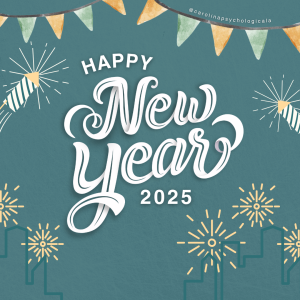The New Year: Embracing the “Same You”
 How do you feel about the New Year? Do you set resolutions and goals? Are you tempted to “reinvent” yourself when the clock strikes midnight?
How do you feel about the New Year? Do you set resolutions and goals? Are you tempted to “reinvent” yourself when the clock strikes midnight?
There is immense pressure, through cultural norms and advertisements, to be a “better you” in the new year. Goals and growth are great things to strive for, but when we get wrapped up in them, we can forget one important part of the equation: you.
You have made it this far. So, what if we embraced the “same you” to make small improvements instead of seeking drastic, frankly, unrealistic changes?
Take a moment to think about and list out your strengths, unique qualities, and experiences over the past year. Reflecting is an important place to start.
Starting the new year with huge, unrealistic goals can lead to anxiety, stress, and disappointment. How long have you kept a New Year’s resolution? According to a Forbes Poll, an average of just 3.74 months with only 22% of people making it to month 4.
So, if we can agree that typical New Year’s resolutions are not helpful, then let’s explore the “same you” approach: acceptance of who you are as you walk into the new year. You have strengths, value, and worth. Let’s build on these to make small, gradual changes leading to long-term self-improvement. We can’t sprint a marathon, folks. Here are a few things to help guide you in this new approach.
Cultivating Self-Acceptance
Acceptance allows us to embrace things we cannot change or control, giving us the freedom to manage and alter the things within our control. We want to practice self-compassion and self-acceptance at any chance we get. This looks like mindful self-talk (if you wouldn’t say it to a friend don’t say it to yourself), a focus on progress, not perfection, the recognition and acceptance of imperfections, and the celebration of small wins. Self-acceptance is the rejection of perfection, an unhealthy and unrealistic expectation of oneself.
Setting Intentions, Not Expectations
Intentions are far more fruitful and encouraging than expectations. Here’s why. Intentions are intrinsically motivated with a focus on the present moment and your personal effort. Expectations, on the other hand, are beliefs and assumptions about how something “should go” with a focus on the outcome or result. Therefore, expectations can lead to disappointment, stress, and frustration. So, when we focus on intentions we foster mindfulness, self-compassion, and embrace flexibility no matter the outcome. Here are some examples of intentions.
I intend to approach each day with curiosity and openness to learning.
I intend to express gratitude and appreciation to the people I care about.
I intend to remain calm and solution-focused during challenges.
I intend to nourish my body with healthy food and rest.
These all are related to how you want to show up, not about the outcome.
Prioritizing Mental Health During Growth
Growth is difficult and you need support when growing and learning. Prioritizing your mental health this year might be the support you need to make your intentions a reality. Here are a few strategies to help prioritize your mental health.
- Boundaries are a great way to prioritize your mental health. When used effectively, they can aid in fostering a work-life balance, decrease screen time, and even relieve tension in some relationships.
- Consistently getting enough sleep and rest are great supports for brain and mental health. Being well-rested can improve cognitive function, allow for good emotional regulation, and improve overall well-being.
- Connect with meaningful community. Feeling cool, calm, collected, and CONNECTED helps our nervous system stay regulated. Blocking off or scheduling time for those you enjoy being around is great for your mental health.
So, cheers to the New Year and embracing the same, awesome you! We are always here to offer counseling services to support you as you walk into 2025.
